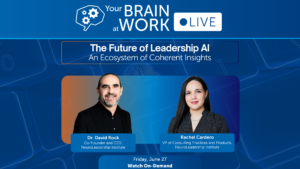We’ve written before about how to be optimistic and realistic during the pandemic, drawing upon the Stockdale Paradox—that is, acknowledging the brutal realities of a situation (realism) but never losing faith in the long-term possibility of success (optimism).
Now, admittedly COVID-19 has been awful for many (layoffs, parents becoming teachers, overall health of loved ones, confusing information). It may not be on the level of what US Navy Vice Admiral James Stockdale went through during the Vietnam War, but it’s a crisis for millions in its own right.
And now recently there’s been news that the pandemic may spread deep into 2021, with the Chief Public Health Officer of Canada recently saying that masks and physical distance could be a reality for “2-3 years.” There are also concerns that the winter will see a big spike as more activities naturally move indoors. Or as The Atlantic recently put it: “Face it, the coronavirus is never going away.”
In short, we’re not out of the woods yet, and maybe won’t be for a long time. So how do we thrive amidst all this, instead of falling into despair? Research suggests there are two things to focus on.
“Why Danes are smug”
That’s the title of a 2006 paper by researchers from the University of Southern Denmark. Danes consistently finish atop global and European Union life satisfaction surveys, and one of the core reasons comes back to expectations. Danes have lower expectations, which sounds bad on face but isn’t always: Unrealistically-high expectations, i.e. “This virus will be gone in months,” can lead to stark disappointment.
In the same vein, marathon trainer Steve Magness says that when runners go into a race anticipating some degree of ease due to weather or course, they often panic when the race becomes difficult at some point. Conversely, if runners start a race by thinking “This one might be hard,” it tends to be easier. The science of this can be explained simply as unexpected threats, like an extra tough hill, are much stronger in the brain (and therefore more debilitating) than expected ones.
In a similar way, a lot of people around the world held out hope that the pandemic might be over by the summer. Right now these folks are struggling harder than others who expected this would last into next year, and planned for this both mentally and physically. Being overly optimistic limits your motivation to take decisive action to make your situation better.
At the same time If we follow Stockdale’s advice, it also doesn’t pay to be completely pessimistic. If we believe this will stay terrible forever, we fall to pieces now, and also don’t take action to improve our lot.
Putting this all together, now is the time to believe that eventually this will all work out, but accept that it is going to be very difficult for some time first. And then get to work on making things even a little better. It’s time to focus on what you can control.
Ground control
Decades of research show that a sense of control is the difference between a challenge being overwhelming or manageable. A sense of control over one’s workspace showed over a 30% increase in people’s performance, and a sense of control over room layout halved the death rate in one study in an aged person’s home. In some animal studies, control during a stressor is literally the difference between life and death. Clearly, focusing on what you can control matters.
There is a lot you cannot control about this pandemic, including how the authorities respond. But you can control how you approach it day by day physically and mentally. LeBron James, for instance, takes essentially the same approach in basketball. While he focuses on the outcome (winning games and championships), he also focuses on the process around everything: what he does before games, when he works out, what he does after games, when he eats, and more. He controls what he can.
The best things to control will be activities that increase your positive emotions. One way to hack our positive response is to do things that are unexpected, in the same way that unexpected threats are the worst, unexpected rewards are also the strongest. If your office has always been super organized, maybe it’s time to do the same to your kitchen which has always been a mess. The delight of finding all your food easily when you want to cook, something you never experienced before, will give you a lift daily.
The best things to control have 2nd and even 3rd order effects. Doing a jigsaw puzzle is calming because it helps increase our sense of certainty. But doing the same kind of activity—moving things around to make new patterns, but in your garden, gives you additional benefits over time of the joy of seeing your improved lot, as well as regular exercise outdoors in nature.
Here’s the takeaway: As the summer closes and we see this pandemic raging on, now is the time to set the right expectations. Assume it will pass eventually and things will be good again—the worst pandemics in history all passed—but that things will be difficult until then.
It’s time to settle in, expect things will be tough for a while but work out in the end, and get focused on the little things in your control that keep you happy.
[action hash= “e54f2543-a3d6-4218-9f85-89ad20e87dd3”]






